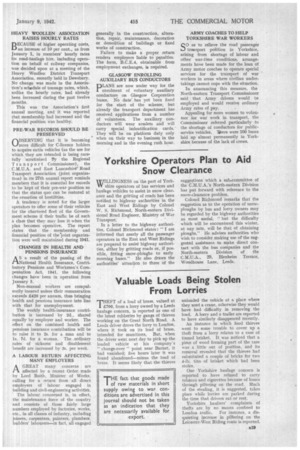HEAVY WOOLLEN ASSOCIATION RAISES HOURLY RATES
Page 23

If you've noticed an error in this article please click here to report it so we can fix it.
BECAUSE of higher operating costs, an increase of 10 per cent., as from January 1, in members hourly rates for road-haulage hire, including operation on behalf of railway companies, was decided upon at a meeting of the Heavy Woollen District Transport Association, recently held in Dewsbury. No change was made in the Association's schedule of tonnage rates, which, unlike the hourly rates, had already been increased during the past twelve months.
This was the Association's first annual meeting, and it was reported that membership had increased and the financial position was healthy.
PRE-WAR RECORDS SHOULD BE PRESERVED
OBSERVING that it is becoming more difficult for C-licence holders to acquire extra vehicles (as the use for which they are intended is being carefully scrutinized 11 the Regional Transport Commissioner), the C.M.U.A. and East Lancashire Road Transport Association (joint organization) in its 27th annual report reminds members that it is essential for records to be kept of their pre-war position so that the status quo can be restored at the cessation of hostilities.
A tendency is noted for the larger operators to offer some of their vehicles for the chartered fleet of the Government scheme if their traffic be of such a class that they may lose it when the plan becomes operative. The report states that the membership and financial position of thejoint organization were well maintained during 1941.
CHANGES IN HEALTH AND PENSIONS INSURANCE
AS a result of the passing of theNational Health Insurance, Contri
butory Pensions and Workmen's Compensation Act, 1941, the following changes have been in operation from January 5.
Non-manual workers are compulsorily insured unless their remuneration exceeds £420 per annum, thus bringing health and pensions insurance into line with that for unemployment.
The weekly health-insurance contribution is increased by 2d., shared equally by employer and worker. The effect on the• combined health and pensions insurance contribution will be to raise it to 2s. for a man and to Is. 7d. for a woman. The ordinary rates of sickness and disablement benefit are increased by 3s. per week.
A LABOUR RETURN AFFECTING MANY EMPLOYERS
AGREAT many concerns are affected by a recent Order made by Lord Reith, Minister of Works, calling for a return from all direct employers of labour engaged in building and civil-engineering activities.
The labour concerned is, in effect, the maintenance force of the country and consists of those fairly large numbers employed by factories, works, etc., in all classes of industry, including joiners, carpenters, painters, plumbers, builders' labourers—in fact, all engaged generally in the construction, alteration, repair, maintenance, decoration or demolition of buildings or fixed works of construction.
Failure to make a proper return renders employers liable to penalties. The form, B.C.E.4, obtainable from employment exchanges, is required.
GLASGOW ENROLLING AUXILIARY BUS CONDUCTORS
PLANS are now under way for the enrolment of voluntary auxiliary conductors on Glasgow Corporation buses. NO date has yet been fixed for the start of the scheme, but already the transport department has received applications from a number of volunteers, The auxiliary conductors will wear armlets and will carry special indentification cards. They will be on platform duty only when on their way to business in the morning and in the evening rush hour.
ARMY COACHES TO HELP 'YORKSHIRE WAR WORKERS
'SO as to relieve the road passenger transport poAition in Yorkshire, arising from shortage of labour and other war-time conditions, arrangements have been made for the loan of Army motor coaches to operate special services for the transport of war workers in areas where civilian undertakings cannot cope with the situation.
In announcing this measure, the North-eastern Transport Commissioner said that Army drivers would be employed and would receive ordinary Army rates of pay. • Appealing for more women to volunteer for war work in transport, the Commissioner referred particularly to the shortage of conductors for publicservice vehicles. Tohere were 100 buses laid up almost permanently in Yorkshire because of the lack of crews.
























































